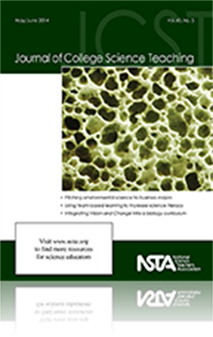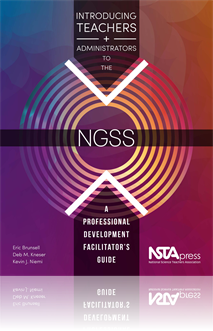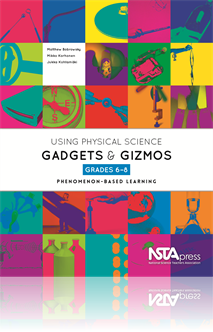All Resources
Journal Article
Case Study: The Mystery of the Seven Deaths: A Case Study in Cellular Respiration
In this interrupted, problem-based case study, students explore the purpose of cellular respiration as they play the role of medical examiner, analyzing autopsy evidence to determine the mysterious cause of death for seven people....
Book Chapter
The activities in this chapter provide an introduction to the NGSS. Activity 1 allows educators to explore the progressions of NGSS to begin understanding the structure of NGSS....
Book Chapter
Facilitating Professional Development Using This Book
This chapter discusses how to use the book to plan professional development. It includes a description of two “strands” of work that schools need to engage in during the implementation process, provides guideposts for effective professional devel...
Book Chapter
This chapter identifies a series of challenging questions and issues that arise frequently during professional development related to the Next Generation Science Standards (NGSS). Through discussions, reflections, and workshop evaluations, we identif...
Book Chapter
This chapter provides suggestions for administrators as they consider how to lead and support implementation of the Next Generation Science Standards (NGSS). It’s important to remember that change happens in a very thoughtful, planned way. Implemen...
Book Chapter
Exploring the Practices and Crosscutting Concepts
This chapter provides a series of activities to help science teachers understand the three dimensions of the Framework for K–12 Science Education—science and engineering practices, crosscutting concepts, and disciplinary core ideas—and how they...
Book Chapter
Supporting Science Learning for All Students
This chapter includes activities that explore the Next Generation Science Standards (NGSS) Appendix D, “All Standards, All Students” and the case studies included with that appendix. These classroom case studies describe instructional approaches ...
Book Chapter
Fostering Discussion About Curricular Decisions
This chapter focuses on beginning discussions related to curricular decisions including course mapping, designing essential questions and performance assessments, and using the Next Generation Science Standards (NGSS) to plan units of instruction. Th...
Book Chapter
Connecting NGSS and the Common Core State Standards
This chapter introduces educators to the connections between the Next Generation Science Standards (NGSS) and the Common Core State Standards (CCSS) in both mathematics and English language arts. The activities provided here will allow participants t...
eBook
Using Physical Science Gadgets and Gizmos, Grades 6-8: Phenomenon-Based Learning (e-book)
What student—or teacher—can resist the chance to experiment with Rocket Launchers, Sound Pipes, Drinking Birds, Dropper Poppers, and more? The 35 experiments in Using Physical Science Gadgets and Gizmos, Grades 6–8, cover topics including pre...
eBook
Argument-Driven Inquiry in Biology: Lab Investigations for Grades 9-12 (e-book)
Are you interested in using argument-driven inquiry for high school lab instruction but just aren’t sure how to do it? You aren’t alone. This book will provide you with both the information and instructional materials you need to start using this...
Journal Article
Teaching science students strategies for studying independently....
Journal Article
Addressing ELLs’ language proficiencies and cognitive abilities in science classrooms....
Journal Article
Scaffolding use of specific science language structures for first-year English language learners....
Journal Article
Vocabulary, Concept, Evidence, and Examples
A reading comprehension strategy using the discourse of science....
Journal Article
Editor's Corner: Science for All
The Science Teacher’s editor shares thoughts on the current issue....
Journal Article
Commentary: Choose Controversies Wisely
When teaching scientific argumentation, selecting the wrong topic can impair—rather than increase—student understanding....
Journal Article
Science 2.0: Teaching STEM With a 3D Printer
This column shares web tools that support learning. This month’s issue discusses ways a 3D printer can be used with the science curriculum....
Journal Article
The Green Room: Pests and Pesticides
This column focuses on making your teaching more environmentally friendly. This month’s issue discusses the environmental, economic, and societal impacts of pesticides and the role of synthetic chemicals in agriculture....
Journal Article
The New Teacher's Toolbox: Tic-Tac-Toe: An Experiment in Student Choice
This column shares tips for teachers just beginning their career. This month’s issue discusses offering students choices in how they demonstrate mastery in a content area....
Journal Article
Career of the Month: An Interview With Snow Scientist Zoe Courville
This column shares interviews with professionals using science in the workplace. This month’s issue describes Zoe Courville's career path to becoming a snow scientist....
Journal Article
Health Wise: Reducing Stress By Improving Study Skills
This Q&A style column provides up-to-date information on current health topics—helping students (and teachers) make healthy choices. This month’s issue discusses the link between stress and study skills....
Journal Article
Safer Science: Eyewash Stations and Showers in the Lab
This column provides best safety practices for the science classroom and laboratory. This month’s issue discusses having engineering controls in place....
Journal Article
Straws and Air Pressure: Using An Everyday Object to Explain Air Pressure
Use straws and other inexpensive items to explore concepts related to air pressure....








